Challenges and Tensions of Social Media for Luxury Hotels: A Report
VerifiedAdded on 2020/01/15
|13
|4758
|163
Report
AI Summary
This report investigates the challenges and tensions that luxury hotels, specifically referencing Hilton Hotels, encounter when using social media for marketing and consumer engagement. The study explores issues such as negative marketing, data security breaches, and the time-consuming nature of managing social media platforms. The literature review highlights the dual nature of social media, which can be a valuable tool for gathering consumer feedback and building customer relationships, while also posing risks to brand value and consumer trust. Key challenges discussed include the need for frequent updates, the importance of staff training, the selection of appropriate content, and the management of accessibility issues to reach the right target market. The report also addresses security concerns, the need for a balance between promotional and informative content, and the importance of selecting the right combination of social media channels to ensure marketing success. Ultimately, the report emphasizes the need for hotels to adapt to the dynamic nature of social media and address issues like participation, staff training, and content selection to achieve effective online marketing strategies.
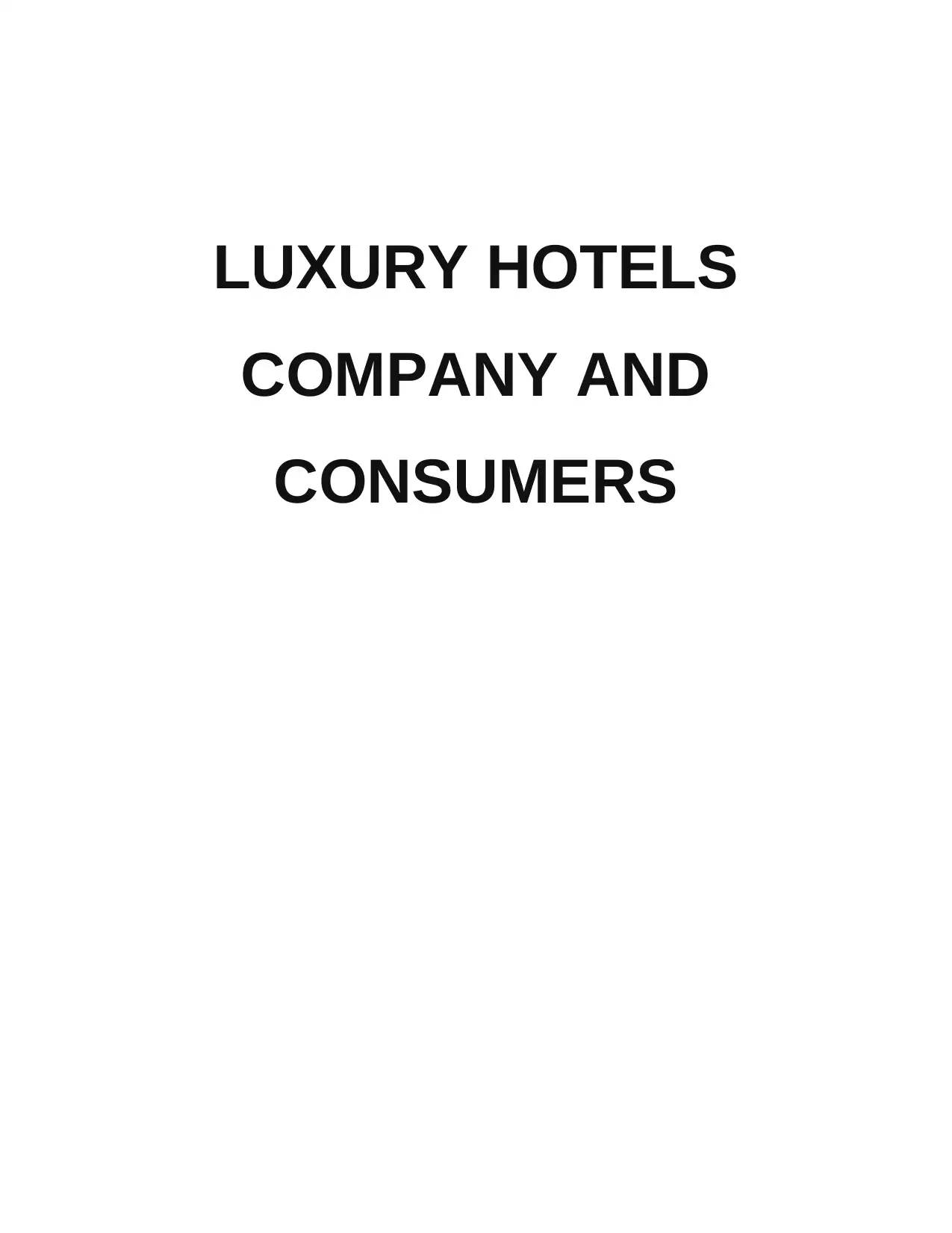
LUXURY HOTELS
COMPANY AND
CONSUMERS
COMPANY AND
CONSUMERS
Paraphrase This Document
Need a fresh take? Get an instant paraphrase of this document with our AI Paraphraser
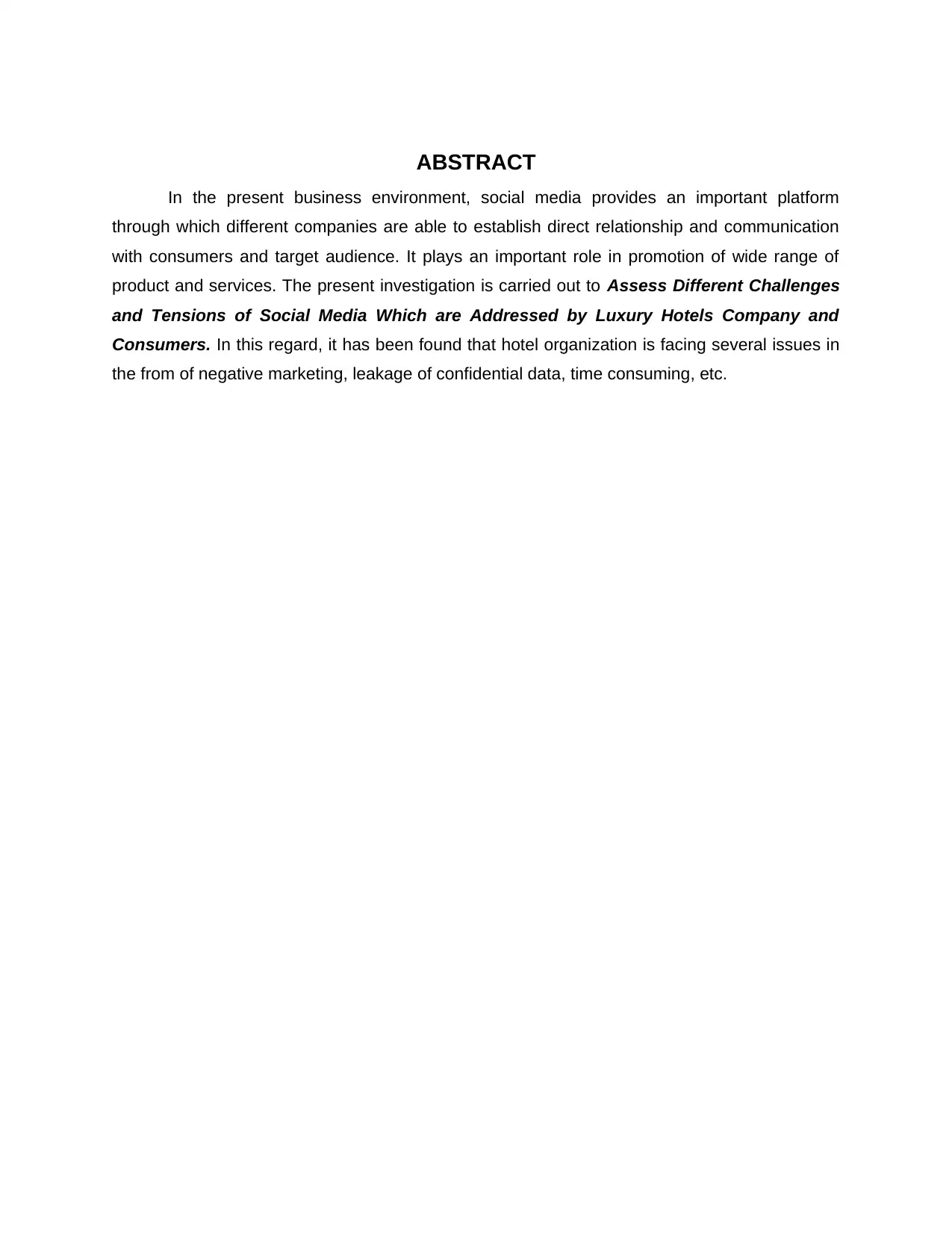
ABSTRACT
In the present business environment, social media provides an important platform
through which different companies are able to establish direct relationship and communication
with consumers and target audience. It plays an important role in promotion of wide range of
product and services. The present investigation is carried out to Assess Different Challenges
and Tensions of Social Media Which are Addressed by Luxury Hotels Company and
Consumers. In this regard, it has been found that hotel organization is facing several issues in
the from of negative marketing, leakage of confidential data, time consuming, etc.
In the present business environment, social media provides an important platform
through which different companies are able to establish direct relationship and communication
with consumers and target audience. It plays an important role in promotion of wide range of
product and services. The present investigation is carried out to Assess Different Challenges
and Tensions of Social Media Which are Addressed by Luxury Hotels Company and
Consumers. In this regard, it has been found that hotel organization is facing several issues in
the from of negative marketing, leakage of confidential data, time consuming, etc.
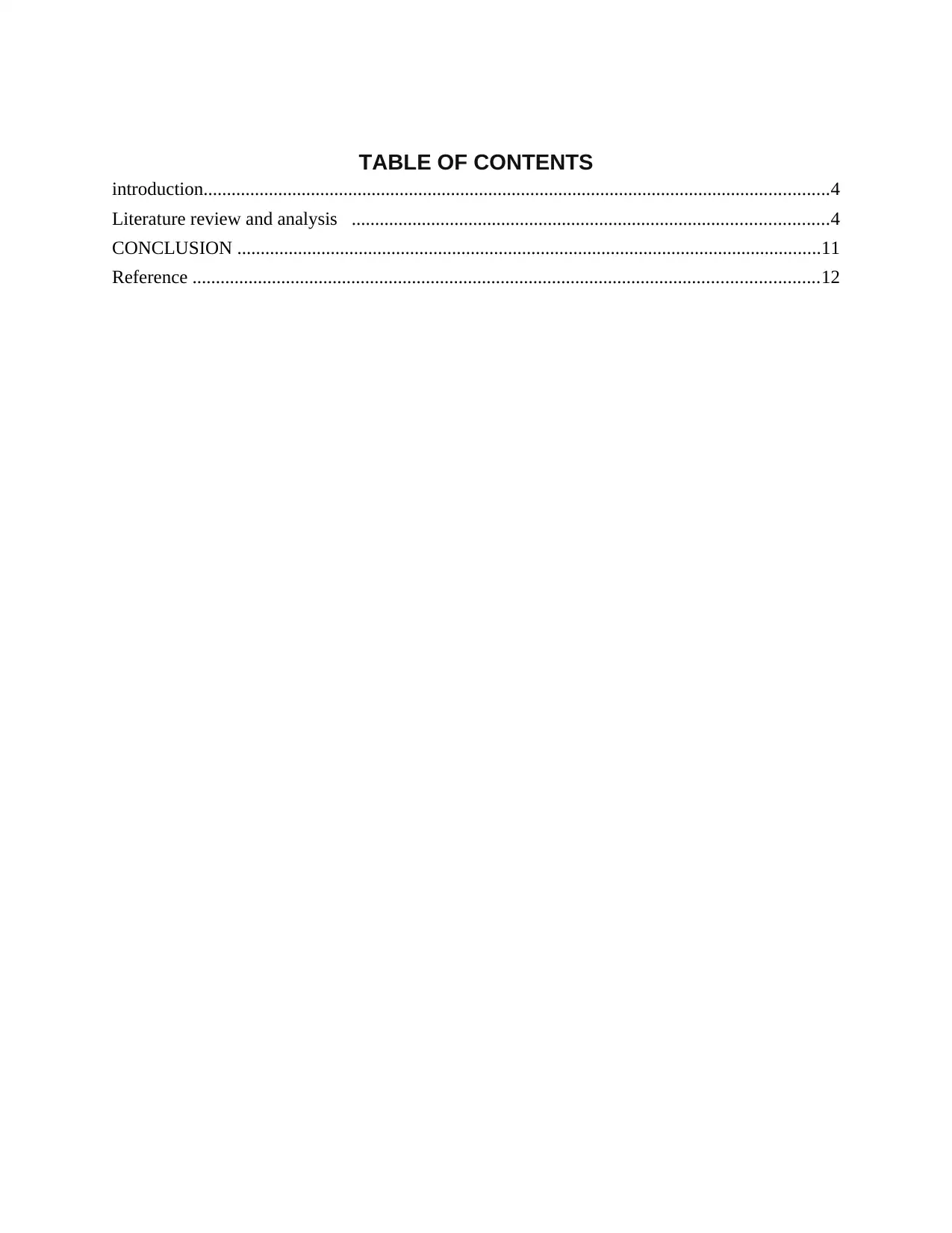
TABLE OF CONTENTS
introduction......................................................................................................................................4
Literature review and analysis ......................................................................................................4
CONCLUSION .............................................................................................................................11
Reference ......................................................................................................................................12
introduction......................................................................................................................................4
Literature review and analysis ......................................................................................................4
CONCLUSION .............................................................................................................................11
Reference ......................................................................................................................................12
⊘ This is a preview!⊘
Do you want full access?
Subscribe today to unlock all pages.

Trusted by 1+ million students worldwide
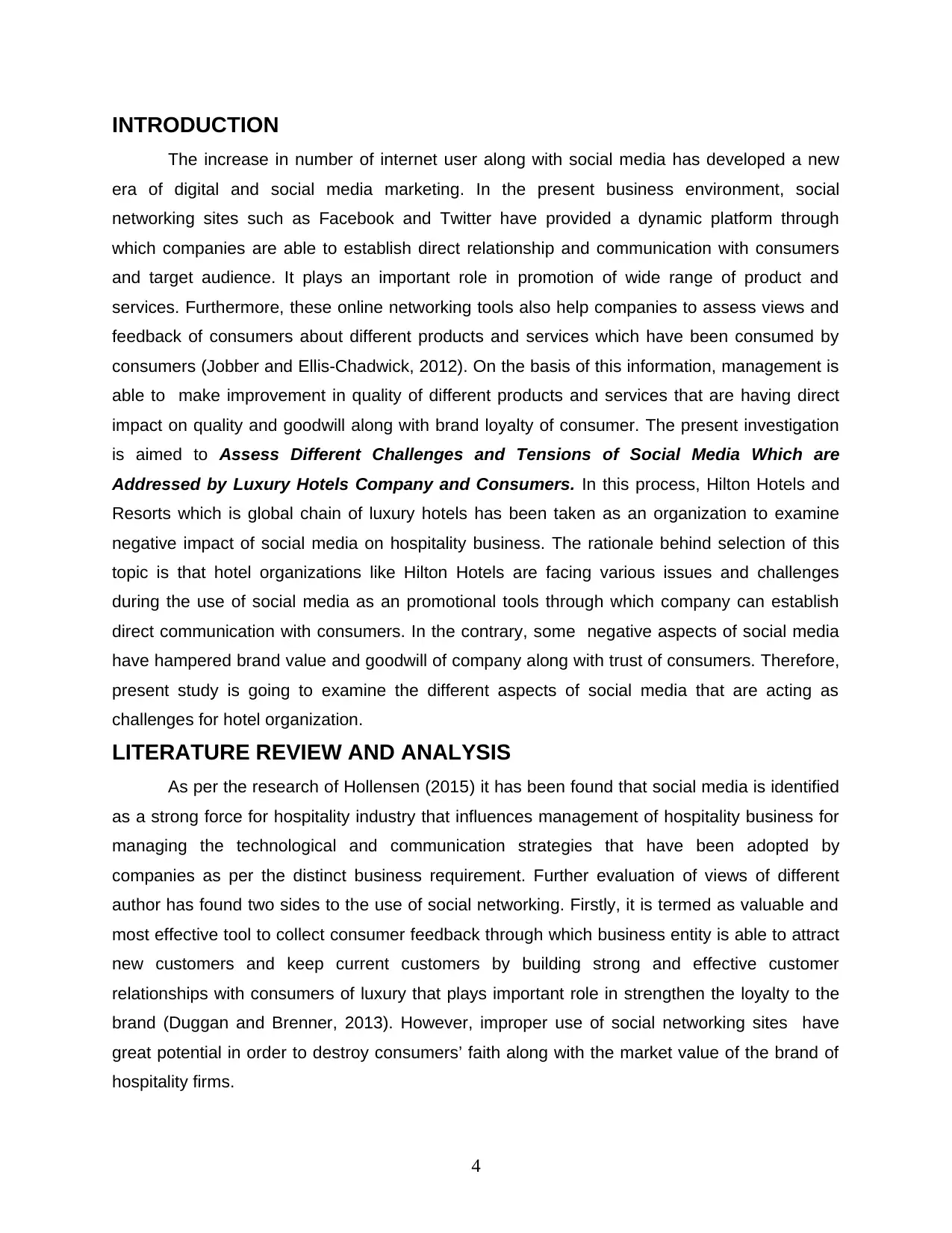
INTRODUCTION
The increase in number of internet user along with social media has developed a new
era of digital and social media marketing. In the present business environment, social
networking sites such as Facebook and Twitter have provided a dynamic platform through
which companies are able to establish direct relationship and communication with consumers
and target audience. It plays an important role in promotion of wide range of product and
services. Furthermore, these online networking tools also help companies to assess views and
feedback of consumers about different products and services which have been consumed by
consumers (Jobber and Ellis-Chadwick, 2012). On the basis of this information, management is
able to make improvement in quality of different products and services that are having direct
impact on quality and goodwill along with brand loyalty of consumer. The present investigation
is aimed to Assess Different Challenges and Tensions of Social Media Which are
Addressed by Luxury Hotels Company and Consumers. In this process, Hilton Hotels and
Resorts which is global chain of luxury hotels has been taken as an organization to examine
negative impact of social media on hospitality business. The rationale behind selection of this
topic is that hotel organizations like Hilton Hotels are facing various issues and challenges
during the use of social media as an promotional tools through which company can establish
direct communication with consumers. In the contrary, some negative aspects of social media
have hampered brand value and goodwill of company along with trust of consumers. Therefore,
present study is going to examine the different aspects of social media that are acting as
challenges for hotel organization.
LITERATURE REVIEW AND ANALYSIS
As per the research of Hollensen (2015) it has been found that social media is identified
as a strong force for hospitality industry that influences management of hospitality business for
managing the technological and communication strategies that have been adopted by
companies as per the distinct business requirement. Further evaluation of views of different
author has found two sides to the use of social networking. Firstly, it is termed as valuable and
most effective tool to collect consumer feedback through which business entity is able to attract
new customers and keep current customers by building strong and effective customer
relationships with consumers of luxury that plays important role in strengthen the loyalty to the
brand (Duggan and Brenner, 2013). However, improper use of social networking sites have
great potential in order to destroy consumers’ faith along with the market value of the brand of
hospitality firms.
4
The increase in number of internet user along with social media has developed a new
era of digital and social media marketing. In the present business environment, social
networking sites such as Facebook and Twitter have provided a dynamic platform through
which companies are able to establish direct relationship and communication with consumers
and target audience. It plays an important role in promotion of wide range of product and
services. Furthermore, these online networking tools also help companies to assess views and
feedback of consumers about different products and services which have been consumed by
consumers (Jobber and Ellis-Chadwick, 2012). On the basis of this information, management is
able to make improvement in quality of different products and services that are having direct
impact on quality and goodwill along with brand loyalty of consumer. The present investigation
is aimed to Assess Different Challenges and Tensions of Social Media Which are
Addressed by Luxury Hotels Company and Consumers. In this process, Hilton Hotels and
Resorts which is global chain of luxury hotels has been taken as an organization to examine
negative impact of social media on hospitality business. The rationale behind selection of this
topic is that hotel organizations like Hilton Hotels are facing various issues and challenges
during the use of social media as an promotional tools through which company can establish
direct communication with consumers. In the contrary, some negative aspects of social media
have hampered brand value and goodwill of company along with trust of consumers. Therefore,
present study is going to examine the different aspects of social media that are acting as
challenges for hotel organization.
LITERATURE REVIEW AND ANALYSIS
As per the research of Hollensen (2015) it has been found that social media is identified
as a strong force for hospitality industry that influences management of hospitality business for
managing the technological and communication strategies that have been adopted by
companies as per the distinct business requirement. Further evaluation of views of different
author has found two sides to the use of social networking. Firstly, it is termed as valuable and
most effective tool to collect consumer feedback through which business entity is able to attract
new customers and keep current customers by building strong and effective customer
relationships with consumers of luxury that plays important role in strengthen the loyalty to the
brand (Duggan and Brenner, 2013). However, improper use of social networking sites have
great potential in order to destroy consumers’ faith along with the market value of the brand of
hospitality firms.
4
Paraphrase This Document
Need a fresh take? Get an instant paraphrase of this document with our AI Paraphraser
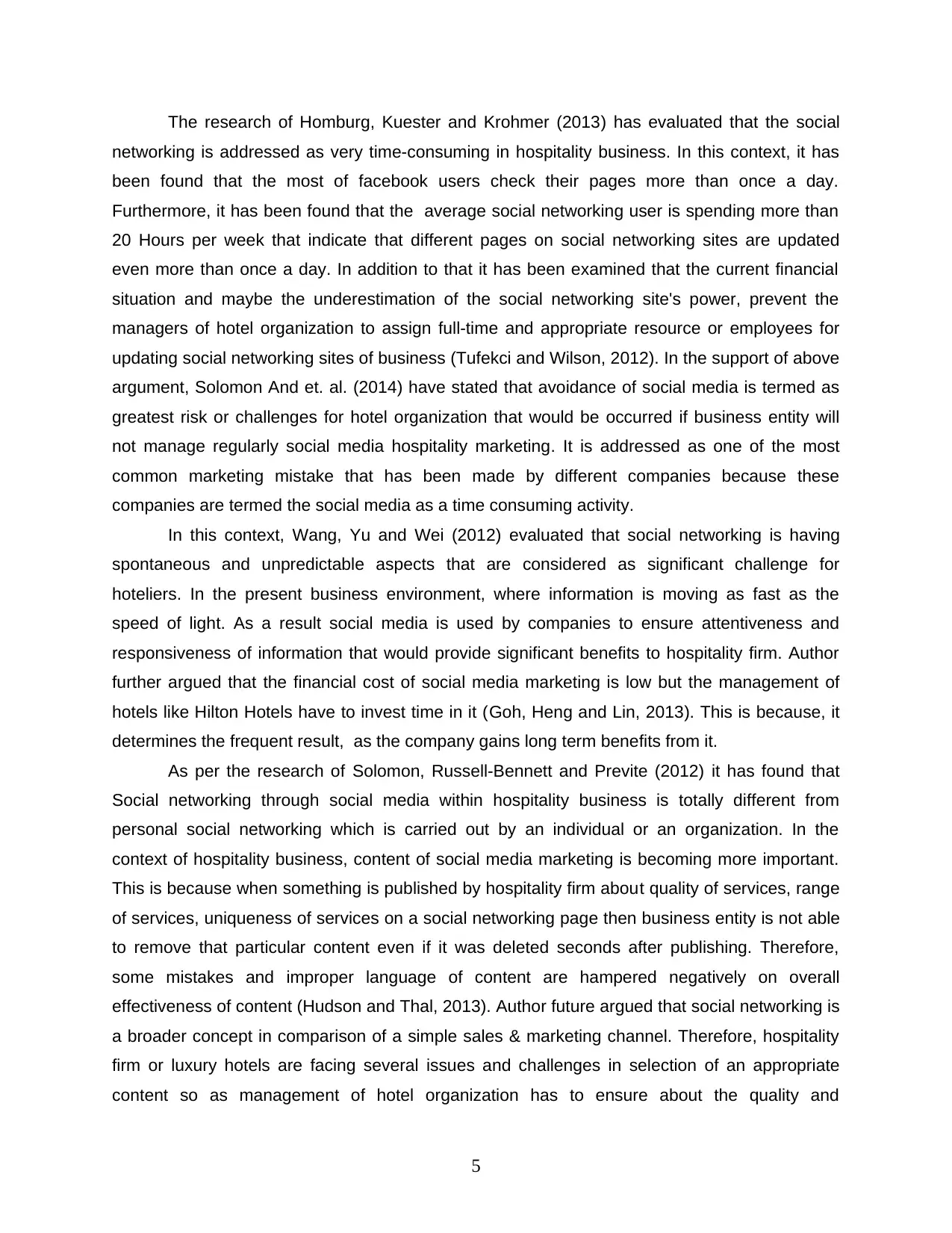
The research of Homburg, Kuester and Krohmer (2013) has evaluated that the social
networking is addressed as very time-consuming in hospitality business. In this context, it has
been found that the most of facebook users check their pages more than once a day.
Furthermore, it has been found that the average social networking user is spending more than
20 Hours per week that indicate that different pages on social networking sites are updated
even more than once a day. In addition to that it has been examined that the current financial
situation and maybe the underestimation of the social networking site's power, prevent the
managers of hotel organization to assign full-time and appropriate resource or employees for
updating social networking sites of business (Tufekci and Wilson, 2012). In the support of above
argument, Solomon And et. al. (2014) have stated that avoidance of social media is termed as
greatest risk or challenges for hotel organization that would be occurred if business entity will
not manage regularly social media hospitality marketing. It is addressed as one of the most
common marketing mistake that has been made by different companies because these
companies are termed the social media as a time consuming activity.
In this context, Wang, Yu and Wei (2012) evaluated that social networking is having
spontaneous and unpredictable aspects that are considered as significant challenge for
hoteliers. In the present business environment, where information is moving as fast as the
speed of light. As a result social media is used by companies to ensure attentiveness and
responsiveness of information that would provide significant benefits to hospitality firm. Author
further argued that the financial cost of social media marketing is low but the management of
hotels like Hilton Hotels have to invest time in it (Goh, Heng and Lin, 2013). This is because, it
determines the frequent result, as the company gains long term benefits from it.
As per the research of Solomon, Russell-Bennett and Previte (2012) it has found that
Social networking through social media within hospitality business is totally different from
personal social networking which is carried out by an individual or an organization. In the
context of hospitality business, content of social media marketing is becoming more important.
This is because when something is published by hospitality firm about quality of services, range
of services, uniqueness of services on a social networking page then business entity is not able
to remove that particular content even if it was deleted seconds after publishing. Therefore,
some mistakes and improper language of content are hampered negatively on overall
effectiveness of content (Hudson and Thal, 2013). Author future argued that social networking is
a broader concept in comparison of a simple sales & marketing channel. Therefore, hospitality
firm or luxury hotels are facing several issues and challenges in selection of an appropriate
content so as management of hotel organization has to ensure about the quality and
5
networking is addressed as very time-consuming in hospitality business. In this context, it has
been found that the most of facebook users check their pages more than once a day.
Furthermore, it has been found that the average social networking user is spending more than
20 Hours per week that indicate that different pages on social networking sites are updated
even more than once a day. In addition to that it has been examined that the current financial
situation and maybe the underestimation of the social networking site's power, prevent the
managers of hotel organization to assign full-time and appropriate resource or employees for
updating social networking sites of business (Tufekci and Wilson, 2012). In the support of above
argument, Solomon And et. al. (2014) have stated that avoidance of social media is termed as
greatest risk or challenges for hotel organization that would be occurred if business entity will
not manage regularly social media hospitality marketing. It is addressed as one of the most
common marketing mistake that has been made by different companies because these
companies are termed the social media as a time consuming activity.
In this context, Wang, Yu and Wei (2012) evaluated that social networking is having
spontaneous and unpredictable aspects that are considered as significant challenge for
hoteliers. In the present business environment, where information is moving as fast as the
speed of light. As a result social media is used by companies to ensure attentiveness and
responsiveness of information that would provide significant benefits to hospitality firm. Author
further argued that the financial cost of social media marketing is low but the management of
hotels like Hilton Hotels have to invest time in it (Goh, Heng and Lin, 2013). This is because, it
determines the frequent result, as the company gains long term benefits from it.
As per the research of Solomon, Russell-Bennett and Previte (2012) it has found that
Social networking through social media within hospitality business is totally different from
personal social networking which is carried out by an individual or an organization. In the
context of hospitality business, content of social media marketing is becoming more important.
This is because when something is published by hospitality firm about quality of services, range
of services, uniqueness of services on a social networking page then business entity is not able
to remove that particular content even if it was deleted seconds after publishing. Therefore,
some mistakes and improper language of content are hampered negatively on overall
effectiveness of content (Hudson and Thal, 2013). Author future argued that social networking is
a broader concept in comparison of a simple sales & marketing channel. Therefore, hospitality
firm or luxury hotels are facing several issues and challenges in selection of an appropriate
content so as management of hotel organization has to ensure about the quality and
5
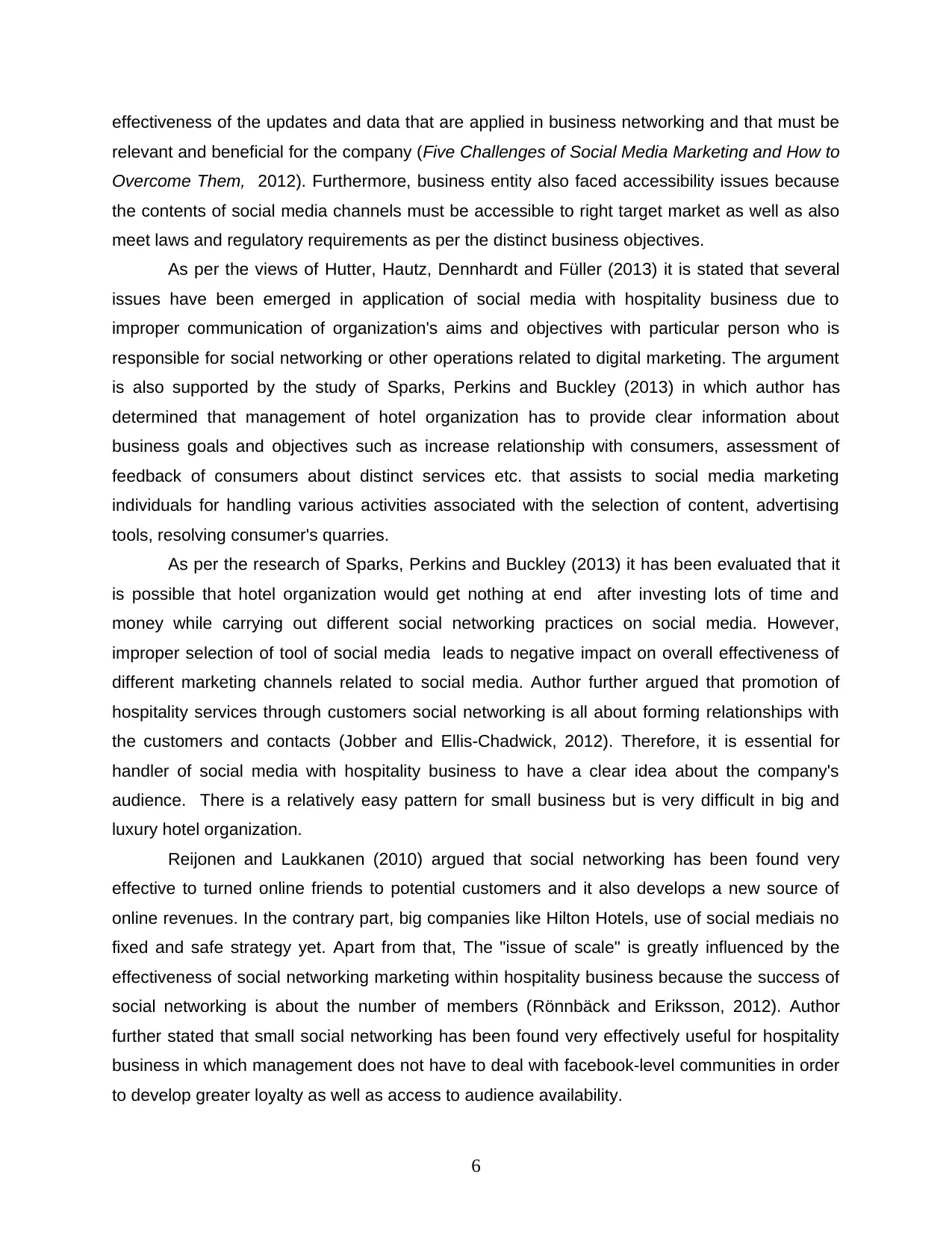
effectiveness of the updates and data that are applied in business networking and that must be
relevant and beneficial for the company (Five Challenges of Social Media Marketing and How to
Overcome Them, 2012). Furthermore, business entity also faced accessibility issues because
the contents of social media channels must be accessible to right target market as well as also
meet laws and regulatory requirements as per the distinct business objectives.
As per the views of Hutter, Hautz, Dennhardt and Füller (2013) it is stated that several
issues have been emerged in application of social media with hospitality business due to
improper communication of organization's aims and objectives with particular person who is
responsible for social networking or other operations related to digital marketing. The argument
is also supported by the study of Sparks, Perkins and Buckley (2013) in which author has
determined that management of hotel organization has to provide clear information about
business goals and objectives such as increase relationship with consumers, assessment of
feedback of consumers about distinct services etc. that assists to social media marketing
individuals for handling various activities associated with the selection of content, advertising
tools, resolving consumer's quarries.
As per the research of Sparks, Perkins and Buckley (2013) it has been evaluated that it
is possible that hotel organization would get nothing at end after investing lots of time and
money while carrying out different social networking practices on social media. However,
improper selection of tool of social media leads to negative impact on overall effectiveness of
different marketing channels related to social media. Author further argued that promotion of
hospitality services through customers social networking is all about forming relationships with
the customers and contacts (Jobber and Ellis-Chadwick, 2012). Therefore, it is essential for
handler of social media with hospitality business to have a clear idea about the company's
audience. There is a relatively easy pattern for small business but is very difficult in big and
luxury hotel organization.
Reijonen and Laukkanen (2010) argued that social networking has been found very
effective to turned online friends to potential customers and it also develops a new source of
online revenues. In the contrary part, big companies like Hilton Hotels, use of social mediais no
fixed and safe strategy yet. Apart from that, The "issue of scale" is greatly influenced by the
effectiveness of social networking marketing within hospitality business because the success of
social networking is about the number of members (Rönnbäck and Eriksson, 2012). Author
further stated that small social networking has been found very effectively useful for hospitality
business in which management does not have to deal with facebook-level communities in order
to develop greater loyalty as well as access to audience availability.
6
relevant and beneficial for the company (Five Challenges of Social Media Marketing and How to
Overcome Them, 2012). Furthermore, business entity also faced accessibility issues because
the contents of social media channels must be accessible to right target market as well as also
meet laws and regulatory requirements as per the distinct business objectives.
As per the views of Hutter, Hautz, Dennhardt and Füller (2013) it is stated that several
issues have been emerged in application of social media with hospitality business due to
improper communication of organization's aims and objectives with particular person who is
responsible for social networking or other operations related to digital marketing. The argument
is also supported by the study of Sparks, Perkins and Buckley (2013) in which author has
determined that management of hotel organization has to provide clear information about
business goals and objectives such as increase relationship with consumers, assessment of
feedback of consumers about distinct services etc. that assists to social media marketing
individuals for handling various activities associated with the selection of content, advertising
tools, resolving consumer's quarries.
As per the research of Sparks, Perkins and Buckley (2013) it has been evaluated that it
is possible that hotel organization would get nothing at end after investing lots of time and
money while carrying out different social networking practices on social media. However,
improper selection of tool of social media leads to negative impact on overall effectiveness of
different marketing channels related to social media. Author further argued that promotion of
hospitality services through customers social networking is all about forming relationships with
the customers and contacts (Jobber and Ellis-Chadwick, 2012). Therefore, it is essential for
handler of social media with hospitality business to have a clear idea about the company's
audience. There is a relatively easy pattern for small business but is very difficult in big and
luxury hotel organization.
Reijonen and Laukkanen (2010) argued that social networking has been found very
effective to turned online friends to potential customers and it also develops a new source of
online revenues. In the contrary part, big companies like Hilton Hotels, use of social mediais no
fixed and safe strategy yet. Apart from that, The "issue of scale" is greatly influenced by the
effectiveness of social networking marketing within hospitality business because the success of
social networking is about the number of members (Rönnbäck and Eriksson, 2012). Author
further stated that small social networking has been found very effectively useful for hospitality
business in which management does not have to deal with facebook-level communities in order
to develop greater loyalty as well as access to audience availability.
6
⊘ This is a preview!⊘
Do you want full access?
Subscribe today to unlock all pages.

Trusted by 1+ million students worldwide
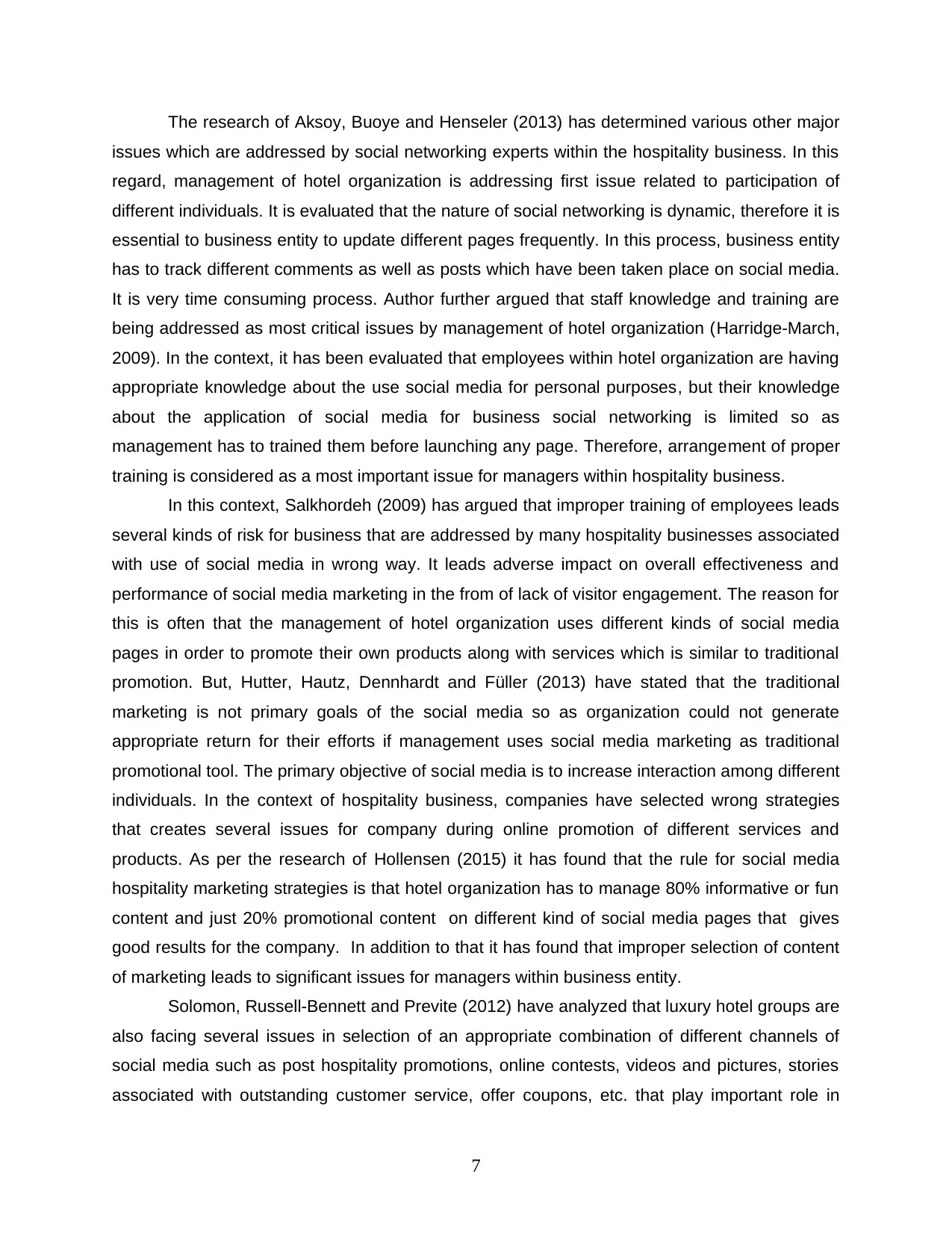
The research of Aksoy, Buoye and Henseler (2013) has determined various other major
issues which are addressed by social networking experts within the hospitality business. In this
regard, management of hotel organization is addressing first issue related to participation of
different individuals. It is evaluated that the nature of social networking is dynamic, therefore it is
essential to business entity to update different pages frequently. In this process, business entity
has to track different comments as well as posts which have been taken place on social media.
It is very time consuming process. Author further argued that staff knowledge and training are
being addressed as most critical issues by management of hotel organization (Harridge-March,
2009). In the context, it has been evaluated that employees within hotel organization are having
appropriate knowledge about the use social media for personal purposes, but their knowledge
about the application of social media for business social networking is limited so as
management has to trained them before launching any page. Therefore, arrangement of proper
training is considered as a most important issue for managers within hospitality business.
In this context, Salkhordeh (2009) has argued that improper training of employees leads
several kinds of risk for business that are addressed by many hospitality businesses associated
with use of social media in wrong way. It leads adverse impact on overall effectiveness and
performance of social media marketing in the from of lack of visitor engagement. The reason for
this is often that the management of hotel organization uses different kinds of social media
pages in order to promote their own products along with services which is similar to traditional
promotion. But, Hutter, Hautz, Dennhardt and Füller (2013) have stated that the traditional
marketing is not primary goals of the social media so as organization could not generate
appropriate return for their efforts if management uses social media marketing as traditional
promotional tool. The primary objective of social media is to increase interaction among different
individuals. In the context of hospitality business, companies have selected wrong strategies
that creates several issues for company during online promotion of different services and
products. As per the research of Hollensen (2015) it has found that the rule for social media
hospitality marketing strategies is that hotel organization has to manage 80% informative or fun
content and just 20% promotional content on different kind of social media pages that gives
good results for the company. In addition to that it has found that improper selection of content
of marketing leads to significant issues for managers within business entity.
Solomon, Russell-Bennett and Previte (2012) have analyzed that luxury hotel groups are
also facing several issues in selection of an appropriate combination of different channels of
social media such as post hospitality promotions, online contests, videos and pictures, stories
associated with outstanding customer service, offer coupons, etc. that play important role in
7
issues which are addressed by social networking experts within the hospitality business. In this
regard, management of hotel organization is addressing first issue related to participation of
different individuals. It is evaluated that the nature of social networking is dynamic, therefore it is
essential to business entity to update different pages frequently. In this process, business entity
has to track different comments as well as posts which have been taken place on social media.
It is very time consuming process. Author further argued that staff knowledge and training are
being addressed as most critical issues by management of hotel organization (Harridge-March,
2009). In the context, it has been evaluated that employees within hotel organization are having
appropriate knowledge about the use social media for personal purposes, but their knowledge
about the application of social media for business social networking is limited so as
management has to trained them before launching any page. Therefore, arrangement of proper
training is considered as a most important issue for managers within hospitality business.
In this context, Salkhordeh (2009) has argued that improper training of employees leads
several kinds of risk for business that are addressed by many hospitality businesses associated
with use of social media in wrong way. It leads adverse impact on overall effectiveness and
performance of social media marketing in the from of lack of visitor engagement. The reason for
this is often that the management of hotel organization uses different kinds of social media
pages in order to promote their own products along with services which is similar to traditional
promotion. But, Hutter, Hautz, Dennhardt and Füller (2013) have stated that the traditional
marketing is not primary goals of the social media so as organization could not generate
appropriate return for their efforts if management uses social media marketing as traditional
promotional tool. The primary objective of social media is to increase interaction among different
individuals. In the context of hospitality business, companies have selected wrong strategies
that creates several issues for company during online promotion of different services and
products. As per the research of Hollensen (2015) it has found that the rule for social media
hospitality marketing strategies is that hotel organization has to manage 80% informative or fun
content and just 20% promotional content on different kind of social media pages that gives
good results for the company. In addition to that it has found that improper selection of content
of marketing leads to significant issues for managers within business entity.
Solomon, Russell-Bennett and Previte (2012) have analyzed that luxury hotel groups are
also facing several issues in selection of an appropriate combination of different channels of
social media such as post hospitality promotions, online contests, videos and pictures, stories
associated with outstanding customer service, offer coupons, etc. that play important role in
7
Paraphrase This Document
Need a fresh take? Get an instant paraphrase of this document with our AI Paraphraser
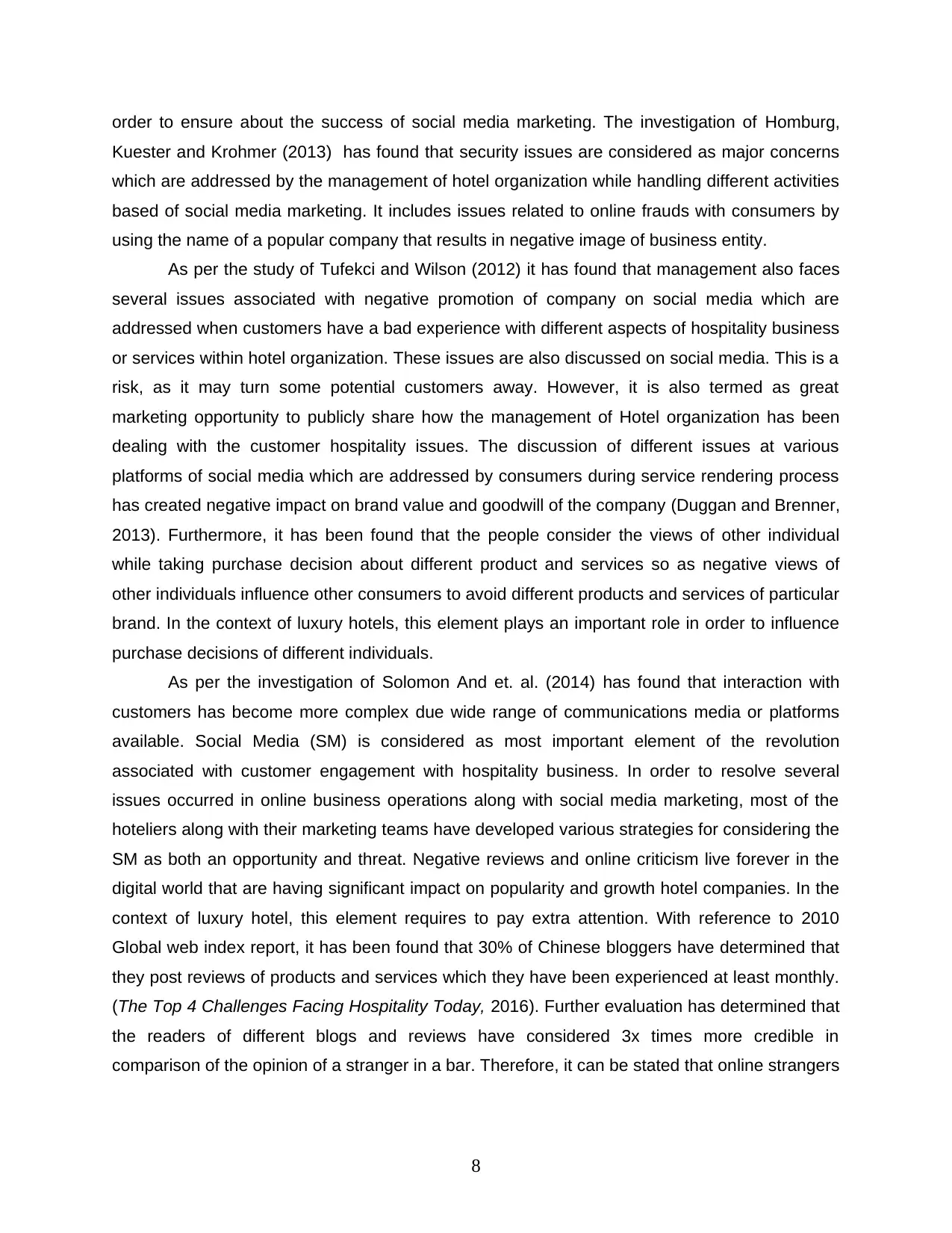
order to ensure about the success of social media marketing. The investigation of Homburg,
Kuester and Krohmer (2013) has found that security issues are considered as major concerns
which are addressed by the management of hotel organization while handling different activities
based of social media marketing. It includes issues related to online frauds with consumers by
using the name of a popular company that results in negative image of business entity.
As per the study of Tufekci and Wilson (2012) it has found that management also faces
several issues associated with negative promotion of company on social media which are
addressed when customers have a bad experience with different aspects of hospitality business
or services within hotel organization. These issues are also discussed on social media. This is a
risk, as it may turn some potential customers away. However, it is also termed as great
marketing opportunity to publicly share how the management of Hotel organization has been
dealing with the customer hospitality issues. The discussion of different issues at various
platforms of social media which are addressed by consumers during service rendering process
has created negative impact on brand value and goodwill of the company (Duggan and Brenner,
2013). Furthermore, it has been found that the people consider the views of other individual
while taking purchase decision about different product and services so as negative views of
other individuals influence other consumers to avoid different products and services of particular
brand. In the context of luxury hotels, this element plays an important role in order to influence
purchase decisions of different individuals.
As per the investigation of Solomon And et. al. (2014) has found that interaction with
customers has become more complex due wide range of communications media or platforms
available. Social Media (SM) is considered as most important element of the revolution
associated with customer engagement with hospitality business. In order to resolve several
issues occurred in online business operations along with social media marketing, most of the
hoteliers along with their marketing teams have developed various strategies for considering the
SM as both an opportunity and threat. Negative reviews and online criticism live forever in the
digital world that are having significant impact on popularity and growth hotel companies. In the
context of luxury hotel, this element requires to pay extra attention. With reference to 2010
Global web index report, it has been found that 30% of Chinese bloggers have determined that
they post reviews of products and services which they have been experienced at least monthly.
(The Top 4 Challenges Facing Hospitality Today, 2016). Further evaluation has determined that
the readers of different blogs and reviews have considered 3x times more credible in
comparison of the opinion of a stranger in a bar. Therefore, it can be stated that online strangers
8
Kuester and Krohmer (2013) has found that security issues are considered as major concerns
which are addressed by the management of hotel organization while handling different activities
based of social media marketing. It includes issues related to online frauds with consumers by
using the name of a popular company that results in negative image of business entity.
As per the study of Tufekci and Wilson (2012) it has found that management also faces
several issues associated with negative promotion of company on social media which are
addressed when customers have a bad experience with different aspects of hospitality business
or services within hotel organization. These issues are also discussed on social media. This is a
risk, as it may turn some potential customers away. However, it is also termed as great
marketing opportunity to publicly share how the management of Hotel organization has been
dealing with the customer hospitality issues. The discussion of different issues at various
platforms of social media which are addressed by consumers during service rendering process
has created negative impact on brand value and goodwill of the company (Duggan and Brenner,
2013). Furthermore, it has been found that the people consider the views of other individual
while taking purchase decision about different product and services so as negative views of
other individuals influence other consumers to avoid different products and services of particular
brand. In the context of luxury hotels, this element plays an important role in order to influence
purchase decisions of different individuals.
As per the investigation of Solomon And et. al. (2014) has found that interaction with
customers has become more complex due wide range of communications media or platforms
available. Social Media (SM) is considered as most important element of the revolution
associated with customer engagement with hospitality business. In order to resolve several
issues occurred in online business operations along with social media marketing, most of the
hoteliers along with their marketing teams have developed various strategies for considering the
SM as both an opportunity and threat. Negative reviews and online criticism live forever in the
digital world that are having significant impact on popularity and growth hotel companies. In the
context of luxury hotel, this element requires to pay extra attention. With reference to 2010
Global web index report, it has been found that 30% of Chinese bloggers have determined that
they post reviews of products and services which they have been experienced at least monthly.
(The Top 4 Challenges Facing Hospitality Today, 2016). Further evaluation has determined that
the readers of different blogs and reviews have considered 3x times more credible in
comparison of the opinion of a stranger in a bar. Therefore, it can be stated that online strangers
8
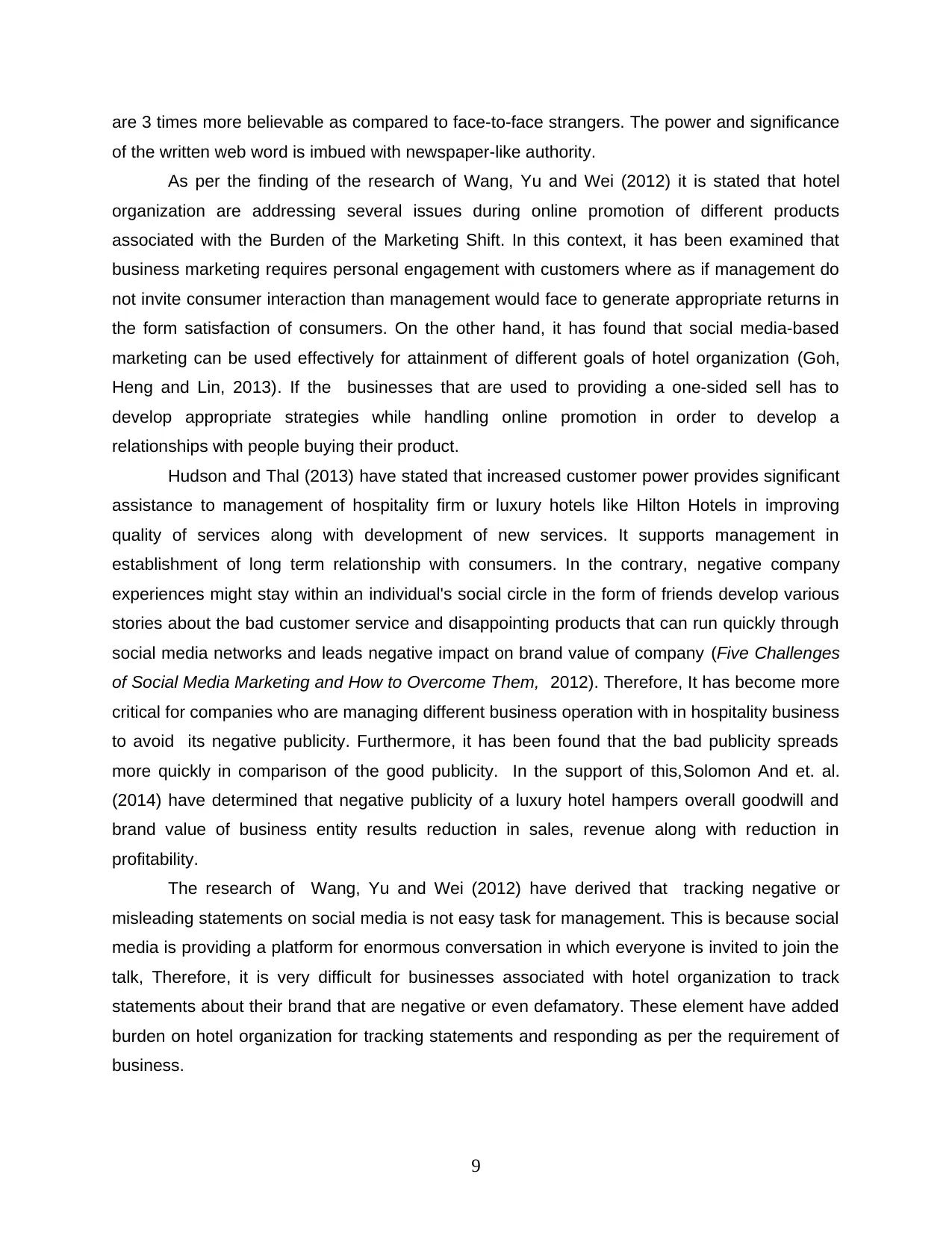
are 3 times more believable as compared to face-to-face strangers. The power and significance
of the written web word is imbued with newspaper-like authority.
As per the finding of the research of Wang, Yu and Wei (2012) it is stated that hotel
organization are addressing several issues during online promotion of different products
associated with the Burden of the Marketing Shift. In this context, it has been examined that
business marketing requires personal engagement with customers where as if management do
not invite consumer interaction than management would face to generate appropriate returns in
the form satisfaction of consumers. On the other hand, it has found that social media-based
marketing can be used effectively for attainment of different goals of hotel organization (Goh,
Heng and Lin, 2013). If the businesses that are used to providing a one-sided sell has to
develop appropriate strategies while handling online promotion in order to develop a
relationships with people buying their product.
Hudson and Thal (2013) have stated that increased customer power provides significant
assistance to management of hospitality firm or luxury hotels like Hilton Hotels in improving
quality of services along with development of new services. It supports management in
establishment of long term relationship with consumers. In the contrary, negative company
experiences might stay within an individual's social circle in the form of friends develop various
stories about the bad customer service and disappointing products that can run quickly through
social media networks and leads negative impact on brand value of company (Five Challenges
of Social Media Marketing and How to Overcome Them, 2012). Therefore, It has become more
critical for companies who are managing different business operation with in hospitality business
to avoid its negative publicity. Furthermore, it has been found that the bad publicity spreads
more quickly in comparison of the good publicity. In the support of this,Solomon And et. al.
(2014) have determined that negative publicity of a luxury hotel hampers overall goodwill and
brand value of business entity results reduction in sales, revenue along with reduction in
profitability.
The research of Wang, Yu and Wei (2012) have derived that tracking negative or
misleading statements on social media is not easy task for management. This is because social
media is providing a platform for enormous conversation in which everyone is invited to join the
talk, Therefore, it is very difficult for businesses associated with hotel organization to track
statements about their brand that are negative or even defamatory. These element have added
burden on hotel organization for tracking statements and responding as per the requirement of
business.
9
of the written web word is imbued with newspaper-like authority.
As per the finding of the research of Wang, Yu and Wei (2012) it is stated that hotel
organization are addressing several issues during online promotion of different products
associated with the Burden of the Marketing Shift. In this context, it has been examined that
business marketing requires personal engagement with customers where as if management do
not invite consumer interaction than management would face to generate appropriate returns in
the form satisfaction of consumers. On the other hand, it has found that social media-based
marketing can be used effectively for attainment of different goals of hotel organization (Goh,
Heng and Lin, 2013). If the businesses that are used to providing a one-sided sell has to
develop appropriate strategies while handling online promotion in order to develop a
relationships with people buying their product.
Hudson and Thal (2013) have stated that increased customer power provides significant
assistance to management of hospitality firm or luxury hotels like Hilton Hotels in improving
quality of services along with development of new services. It supports management in
establishment of long term relationship with consumers. In the contrary, negative company
experiences might stay within an individual's social circle in the form of friends develop various
stories about the bad customer service and disappointing products that can run quickly through
social media networks and leads negative impact on brand value of company (Five Challenges
of Social Media Marketing and How to Overcome Them, 2012). Therefore, It has become more
critical for companies who are managing different business operation with in hospitality business
to avoid its negative publicity. Furthermore, it has been found that the bad publicity spreads
more quickly in comparison of the good publicity. In the support of this,Solomon And et. al.
(2014) have determined that negative publicity of a luxury hotel hampers overall goodwill and
brand value of business entity results reduction in sales, revenue along with reduction in
profitability.
The research of Wang, Yu and Wei (2012) have derived that tracking negative or
misleading statements on social media is not easy task for management. This is because social
media is providing a platform for enormous conversation in which everyone is invited to join the
talk, Therefore, it is very difficult for businesses associated with hotel organization to track
statements about their brand that are negative or even defamatory. These element have added
burden on hotel organization for tracking statements and responding as per the requirement of
business.
9
⊘ This is a preview!⊘
Do you want full access?
Subscribe today to unlock all pages.

Trusted by 1+ million students worldwide
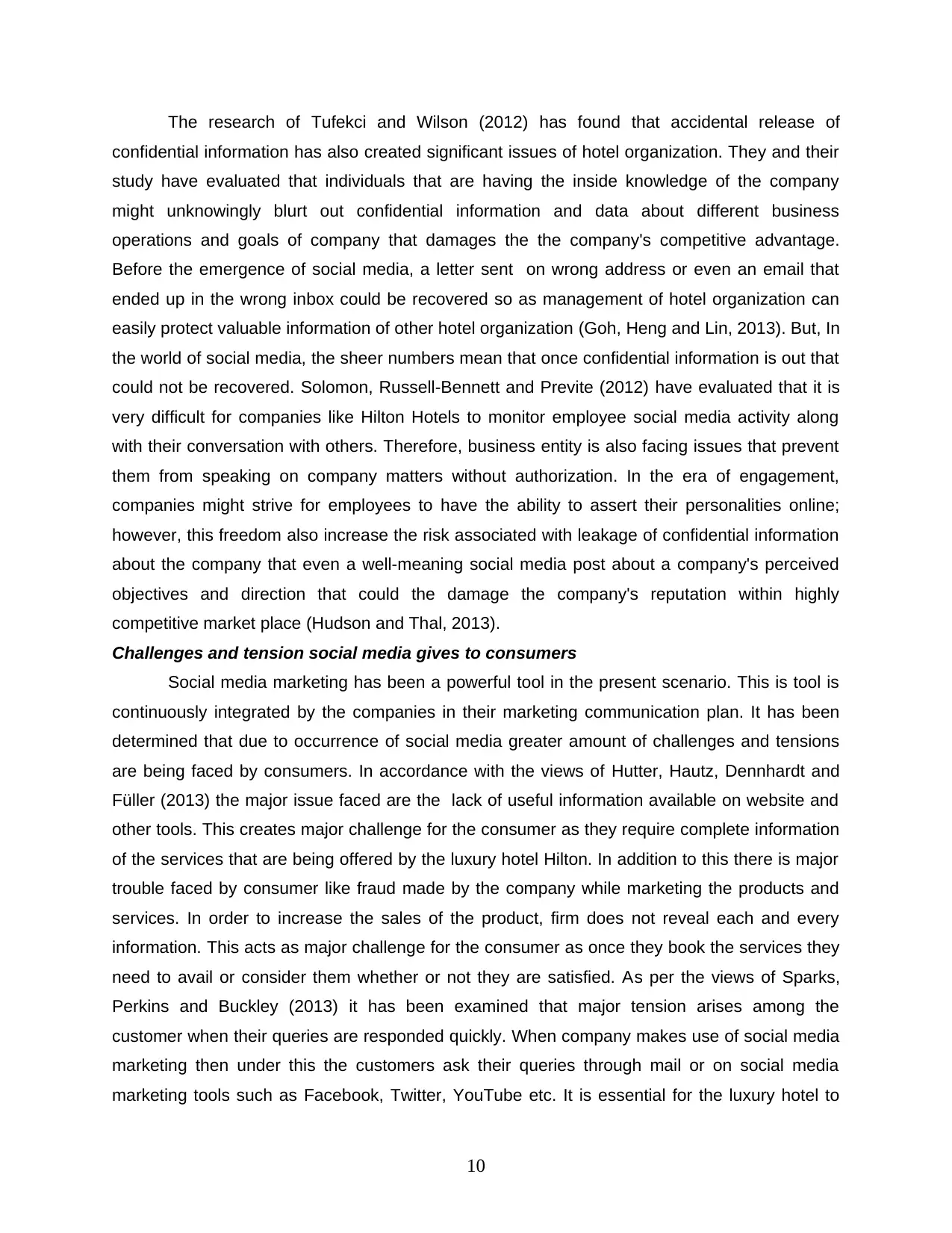
The research of Tufekci and Wilson (2012) has found that accidental release of
confidential information has also created significant issues of hotel organization. They and their
study have evaluated that individuals that are having the inside knowledge of the company
might unknowingly blurt out confidential information and data about different business
operations and goals of company that damages the the company's competitive advantage.
Before the emergence of social media, a letter sent on wrong address or even an email that
ended up in the wrong inbox could be recovered so as management of hotel organization can
easily protect valuable information of other hotel organization (Goh, Heng and Lin, 2013). But, In
the world of social media, the sheer numbers mean that once confidential information is out that
could not be recovered. Solomon, Russell-Bennett and Previte (2012) have evaluated that it is
very difficult for companies like Hilton Hotels to monitor employee social media activity along
with their conversation with others. Therefore, business entity is also facing issues that prevent
them from speaking on company matters without authorization. In the era of engagement,
companies might strive for employees to have the ability to assert their personalities online;
however, this freedom also increase the risk associated with leakage of confidential information
about the company that even a well-meaning social media post about a company's perceived
objectives and direction that could the damage the company's reputation within highly
competitive market place (Hudson and Thal, 2013).
Challenges and tension social media gives to consumers
Social media marketing has been a powerful tool in the present scenario. This is tool is
continuously integrated by the companies in their marketing communication plan. It has been
determined that due to occurrence of social media greater amount of challenges and tensions
are being faced by consumers. In accordance with the views of Hutter, Hautz, Dennhardt and
Füller (2013) the major issue faced are the lack of useful information available on website and
other tools. This creates major challenge for the consumer as they require complete information
of the services that are being offered by the luxury hotel Hilton. In addition to this there is major
trouble faced by consumer like fraud made by the company while marketing the products and
services. In order to increase the sales of the product, firm does not reveal each and every
information. This acts as major challenge for the consumer as once they book the services they
need to avail or consider them whether or not they are satisfied. As per the views of Sparks,
Perkins and Buckley (2013) it has been examined that major tension arises among the
customer when their queries are responded quickly. When company makes use of social media
marketing then under this the customers ask their queries through mail or on social media
marketing tools such as Facebook, Twitter, YouTube etc. It is essential for the luxury hotel to
10
confidential information has also created significant issues of hotel organization. They and their
study have evaluated that individuals that are having the inside knowledge of the company
might unknowingly blurt out confidential information and data about different business
operations and goals of company that damages the the company's competitive advantage.
Before the emergence of social media, a letter sent on wrong address or even an email that
ended up in the wrong inbox could be recovered so as management of hotel organization can
easily protect valuable information of other hotel organization (Goh, Heng and Lin, 2013). But, In
the world of social media, the sheer numbers mean that once confidential information is out that
could not be recovered. Solomon, Russell-Bennett and Previte (2012) have evaluated that it is
very difficult for companies like Hilton Hotels to monitor employee social media activity along
with their conversation with others. Therefore, business entity is also facing issues that prevent
them from speaking on company matters without authorization. In the era of engagement,
companies might strive for employees to have the ability to assert their personalities online;
however, this freedom also increase the risk associated with leakage of confidential information
about the company that even a well-meaning social media post about a company's perceived
objectives and direction that could the damage the company's reputation within highly
competitive market place (Hudson and Thal, 2013).
Challenges and tension social media gives to consumers
Social media marketing has been a powerful tool in the present scenario. This is tool is
continuously integrated by the companies in their marketing communication plan. It has been
determined that due to occurrence of social media greater amount of challenges and tensions
are being faced by consumers. In accordance with the views of Hutter, Hautz, Dennhardt and
Füller (2013) the major issue faced are the lack of useful information available on website and
other tools. This creates major challenge for the consumer as they require complete information
of the services that are being offered by the luxury hotel Hilton. In addition to this there is major
trouble faced by consumer like fraud made by the company while marketing the products and
services. In order to increase the sales of the product, firm does not reveal each and every
information. This acts as major challenge for the consumer as once they book the services they
need to avail or consider them whether or not they are satisfied. As per the views of Sparks,
Perkins and Buckley (2013) it has been examined that major tension arises among the
customer when their queries are responded quickly. When company makes use of social media
marketing then under this the customers ask their queries through mail or on social media
marketing tools such as Facebook, Twitter, YouTube etc. It is essential for the luxury hotel to
10
Paraphrase This Document
Need a fresh take? Get an instant paraphrase of this document with our AI Paraphraser
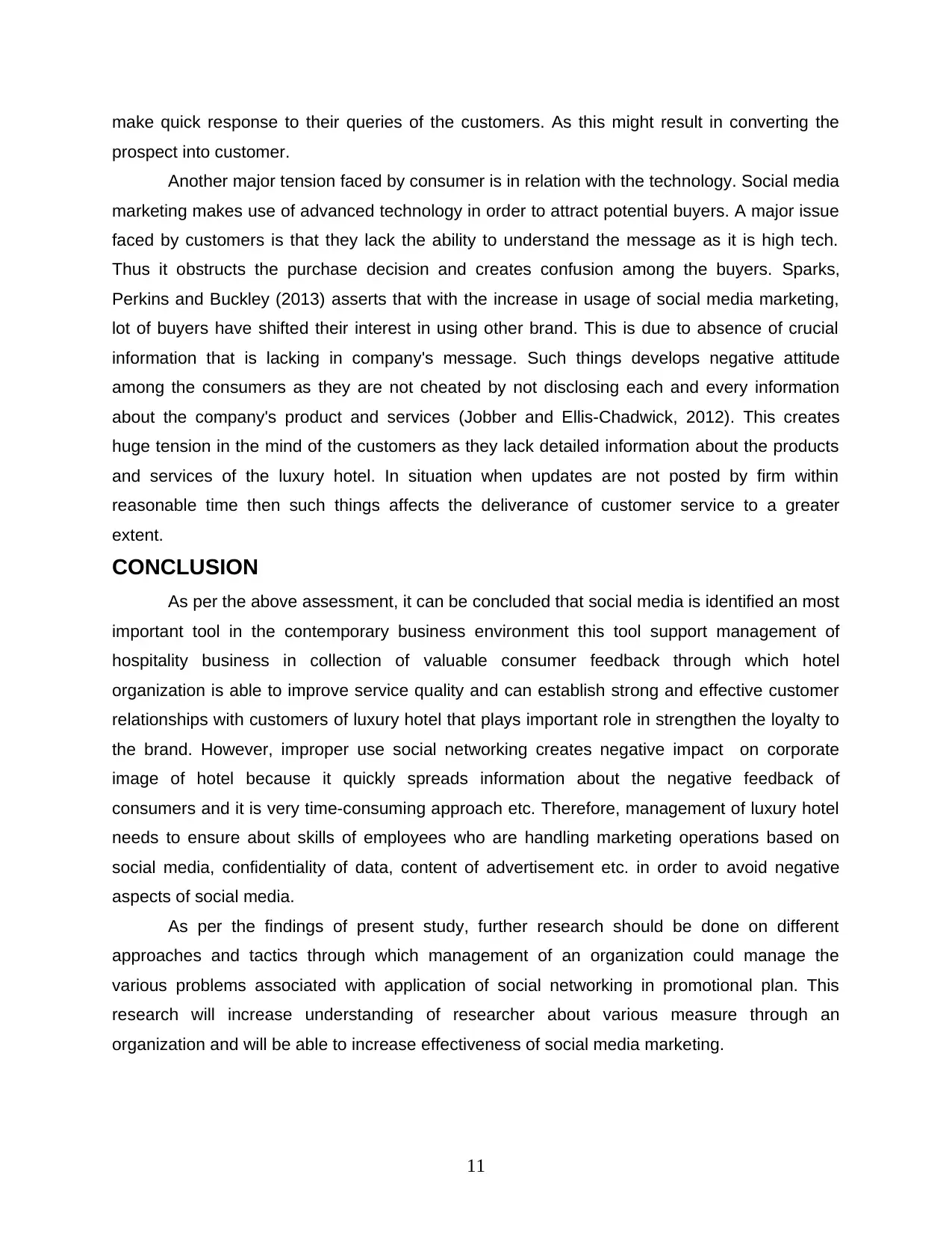
make quick response to their queries of the customers. As this might result in converting the
prospect into customer.
Another major tension faced by consumer is in relation with the technology. Social media
marketing makes use of advanced technology in order to attract potential buyers. A major issue
faced by customers is that they lack the ability to understand the message as it is high tech.
Thus it obstructs the purchase decision and creates confusion among the buyers. Sparks,
Perkins and Buckley (2013) asserts that with the increase in usage of social media marketing,
lot of buyers have shifted their interest in using other brand. This is due to absence of crucial
information that is lacking in company's message. Such things develops negative attitude
among the consumers as they are not cheated by not disclosing each and every information
about the company's product and services (Jobber and Ellis-Chadwick, 2012). This creates
huge tension in the mind of the customers as they lack detailed information about the products
and services of the luxury hotel. In situation when updates are not posted by firm within
reasonable time then such things affects the deliverance of customer service to a greater
extent.
CONCLUSION
As per the above assessment, it can be concluded that social media is identified an most
important tool in the contemporary business environment this tool support management of
hospitality business in collection of valuable consumer feedback through which hotel
organization is able to improve service quality and can establish strong and effective customer
relationships with customers of luxury hotel that plays important role in strengthen the loyalty to
the brand. However, improper use social networking creates negative impact on corporate
image of hotel because it quickly spreads information about the negative feedback of
consumers and it is very time-consuming approach etc. Therefore, management of luxury hotel
needs to ensure about skills of employees who are handling marketing operations based on
social media, confidentiality of data, content of advertisement etc. in order to avoid negative
aspects of social media.
As per the findings of present study, further research should be done on different
approaches and tactics through which management of an organization could manage the
various problems associated with application of social networking in promotional plan. This
research will increase understanding of researcher about various measure through an
organization and will be able to increase effectiveness of social media marketing.
11
prospect into customer.
Another major tension faced by consumer is in relation with the technology. Social media
marketing makes use of advanced technology in order to attract potential buyers. A major issue
faced by customers is that they lack the ability to understand the message as it is high tech.
Thus it obstructs the purchase decision and creates confusion among the buyers. Sparks,
Perkins and Buckley (2013) asserts that with the increase in usage of social media marketing,
lot of buyers have shifted their interest in using other brand. This is due to absence of crucial
information that is lacking in company's message. Such things develops negative attitude
among the consumers as they are not cheated by not disclosing each and every information
about the company's product and services (Jobber and Ellis-Chadwick, 2012). This creates
huge tension in the mind of the customers as they lack detailed information about the products
and services of the luxury hotel. In situation when updates are not posted by firm within
reasonable time then such things affects the deliverance of customer service to a greater
extent.
CONCLUSION
As per the above assessment, it can be concluded that social media is identified an most
important tool in the contemporary business environment this tool support management of
hospitality business in collection of valuable consumer feedback through which hotel
organization is able to improve service quality and can establish strong and effective customer
relationships with customers of luxury hotel that plays important role in strengthen the loyalty to
the brand. However, improper use social networking creates negative impact on corporate
image of hotel because it quickly spreads information about the negative feedback of
consumers and it is very time-consuming approach etc. Therefore, management of luxury hotel
needs to ensure about skills of employees who are handling marketing operations based on
social media, confidentiality of data, content of advertisement etc. in order to avoid negative
aspects of social media.
As per the findings of present study, further research should be done on different
approaches and tactics through which management of an organization could manage the
various problems associated with application of social networking in promotional plan. This
research will increase understanding of researcher about various measure through an
organization and will be able to increase effectiveness of social media marketing.
11
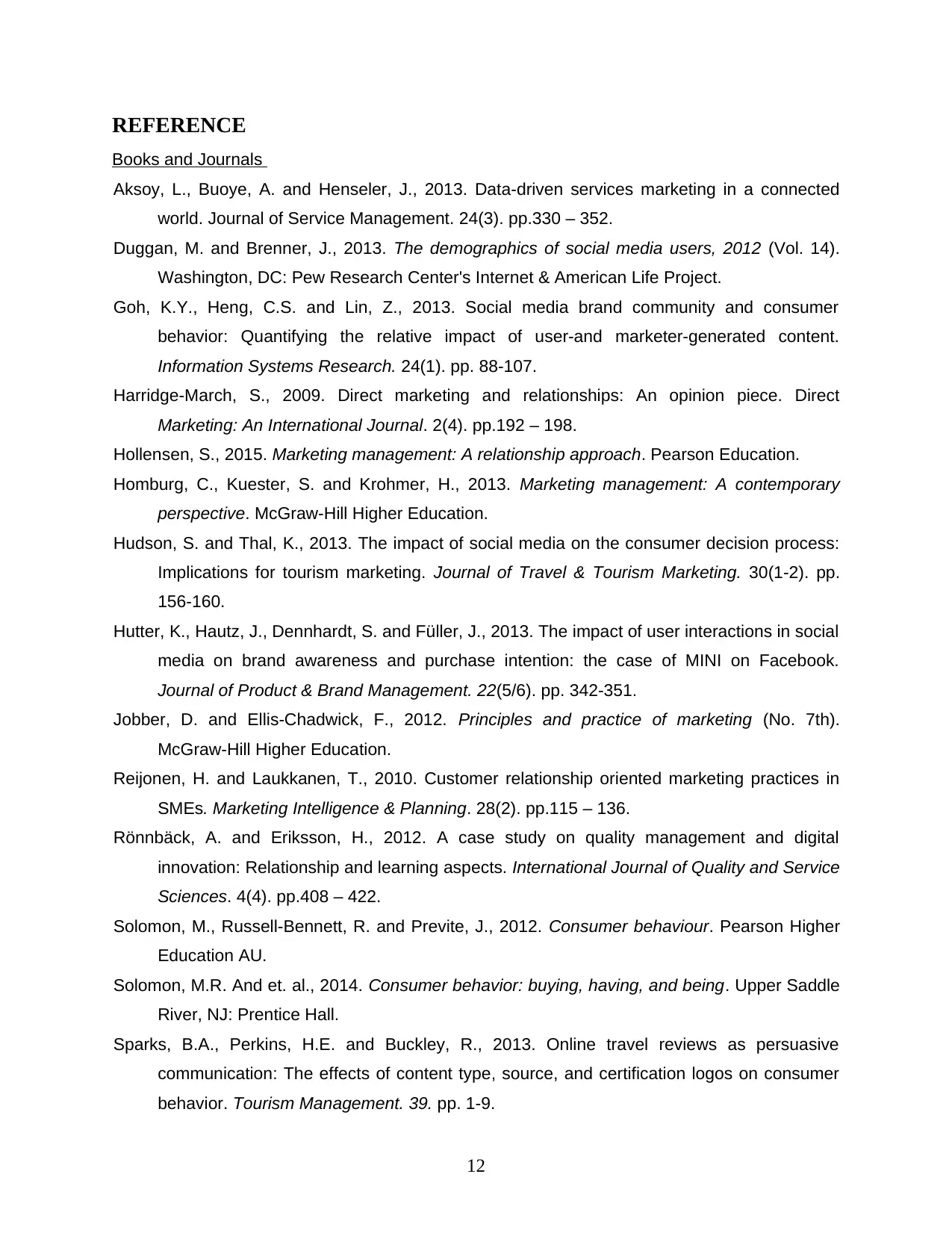
REFERENCE
Books and Journals
Aksoy, L., Buoye, A. and Henseler, J., 2013. Data-driven services marketing in a connected
world. Journal of Service Management. 24(3). pp.330 – 352.
Duggan, M. and Brenner, J., 2013. The demographics of social media users, 2012 (Vol. 14).
Washington, DC: Pew Research Center's Internet & American Life Project.
Goh, K.Y., Heng, C.S. and Lin, Z., 2013. Social media brand community and consumer
behavior: Quantifying the relative impact of user-and marketer-generated content.
Information Systems Research. 24(1). pp. 88-107.
Harridge-March, S., 2009. Direct marketing and relationships: An opinion piece. Direct
Marketing: An International Journal. 2(4). pp.192 – 198.
Hollensen, S., 2015. Marketing management: A relationship approach. Pearson Education.
Homburg, C., Kuester, S. and Krohmer, H., 2013. Marketing management: A contemporary
perspective. McGraw-Hill Higher Education.
Hudson, S. and Thal, K., 2013. The impact of social media on the consumer decision process:
Implications for tourism marketing. Journal of Travel & Tourism Marketing. 30(1-2). pp.
156-160.
Hutter, K., Hautz, J., Dennhardt, S. and Füller, J., 2013. The impact of user interactions in social
media on brand awareness and purchase intention: the case of MINI on Facebook.
Journal of Product & Brand Management. 22(5/6). pp. 342-351.
Jobber, D. and Ellis-Chadwick, F., 2012. Principles and practice of marketing (No. 7th).
McGraw-Hill Higher Education.
Reijonen, H. and Laukkanen, T., 2010. Customer relationship oriented marketing practices in
SMEs. Marketing Intelligence & Planning. 28(2). pp.115 – 136.
Rönnbäck, A. and Eriksson, H., 2012. A case study on quality management and digital
innovation: Relationship and learning aspects. International Journal of Quality and Service
Sciences. 4(4). pp.408 – 422.
Solomon, M., Russell-Bennett, R. and Previte, J., 2012. Consumer behaviour. Pearson Higher
Education AU.
Solomon, M.R. And et. al., 2014. Consumer behavior: buying, having, and being. Upper Saddle
River, NJ: Prentice Hall.
Sparks, B.A., Perkins, H.E. and Buckley, R., 2013. Online travel reviews as persuasive
communication: The effects of content type, source, and certification logos on consumer
behavior. Tourism Management. 39. pp. 1-9.
12
Books and Journals
Aksoy, L., Buoye, A. and Henseler, J., 2013. Data-driven services marketing in a connected
world. Journal of Service Management. 24(3). pp.330 – 352.
Duggan, M. and Brenner, J., 2013. The demographics of social media users, 2012 (Vol. 14).
Washington, DC: Pew Research Center's Internet & American Life Project.
Goh, K.Y., Heng, C.S. and Lin, Z., 2013. Social media brand community and consumer
behavior: Quantifying the relative impact of user-and marketer-generated content.
Information Systems Research. 24(1). pp. 88-107.
Harridge-March, S., 2009. Direct marketing and relationships: An opinion piece. Direct
Marketing: An International Journal. 2(4). pp.192 – 198.
Hollensen, S., 2015. Marketing management: A relationship approach. Pearson Education.
Homburg, C., Kuester, S. and Krohmer, H., 2013. Marketing management: A contemporary
perspective. McGraw-Hill Higher Education.
Hudson, S. and Thal, K., 2013. The impact of social media on the consumer decision process:
Implications for tourism marketing. Journal of Travel & Tourism Marketing. 30(1-2). pp.
156-160.
Hutter, K., Hautz, J., Dennhardt, S. and Füller, J., 2013. The impact of user interactions in social
media on brand awareness and purchase intention: the case of MINI on Facebook.
Journal of Product & Brand Management. 22(5/6). pp. 342-351.
Jobber, D. and Ellis-Chadwick, F., 2012. Principles and practice of marketing (No. 7th).
McGraw-Hill Higher Education.
Reijonen, H. and Laukkanen, T., 2010. Customer relationship oriented marketing practices in
SMEs. Marketing Intelligence & Planning. 28(2). pp.115 – 136.
Rönnbäck, A. and Eriksson, H., 2012. A case study on quality management and digital
innovation: Relationship and learning aspects. International Journal of Quality and Service
Sciences. 4(4). pp.408 – 422.
Solomon, M., Russell-Bennett, R. and Previte, J., 2012. Consumer behaviour. Pearson Higher
Education AU.
Solomon, M.R. And et. al., 2014. Consumer behavior: buying, having, and being. Upper Saddle
River, NJ: Prentice Hall.
Sparks, B.A., Perkins, H.E. and Buckley, R., 2013. Online travel reviews as persuasive
communication: The effects of content type, source, and certification logos on consumer
behavior. Tourism Management. 39. pp. 1-9.
12
⊘ This is a preview!⊘
Do you want full access?
Subscribe today to unlock all pages.

Trusted by 1+ million students worldwide
1 out of 13
Related Documents
Your All-in-One AI-Powered Toolkit for Academic Success.
+13062052269
info@desklib.com
Available 24*7 on WhatsApp / Email
![[object Object]](/_next/static/media/star-bottom.7253800d.svg)
Unlock your academic potential
Copyright © 2020–2026 A2Z Services. All Rights Reserved. Developed and managed by ZUCOL.





